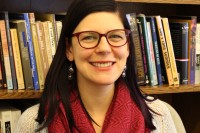Frank Yamada to lead ATS after Daniel Aleshire retires
Frank M. Yamada, president of McCormick Theological Seminary, will be the next executive director of the Association of Theological Schools.
The ATS board unanimously voted to hire Yamada to lead the organization of more than 270 graduate schools in the United States and Canada. ATS’s work includes accreditation and approving degree programs.
Yamada, an ordained minister in the Presbyterian Church (U.S.A.), previously taught Hebrew Bible and directed McCormick’s Center for Asian American Ministries.
“It was not surprising that our exhaustive search led us back to Dr. Yamada,” said James Hudnut-Beumler, chair of the search committee. “He has served on the ATS board of directors since 2014 and shown himself to be a person of great vision with an inclusive spirit and a deep passion for theological education.”
As Yamada prepares to enter the role in July, he sees several sources of hope in the current landscape. One is that the schools have long histories of adapting their models to address changing constituencies.
ATS member institutions “have shown an amazing capacity to be resilient and innovative,” he said. “It’s inspiring to see the way that schools have been agile in their capacity to change.”
In the midst of well-documented challenges for theological education, Yamada plans to move forward with enhancing the existing culture of innovation and ecumenical cooperation among ATS schools.
“Where else can we see such collaboration around a common mission among evangelicals, Catholics, and mainline Protestants?” he said.
Outgoing director Daniel Aleshire, who has worked with ATS for 27 years, including 18 years as executive director, also sees bright spots as he prepares to hand the reins to Yamada.
“We still have talented groups of students who show up each year who sense a call to ministry [and] who are willing to commit to study and preparation,” he said. “In the context of fundamental changes going on in American Christianity, the schools are busily changing to accommodate new and different realities. They’re sustaining thorough study of texts and traditions and the work of communities of faith.”
Aleshire noted that in the past eight years, ATS has admitted almost 30 new institutions, most of them striving to more fully meet the needs of constituencies such as the immigrant populations that are centers of religious energy.
At the same time, the institutions face limited resources in seeking to meet those emerging needs. “Theological schools are outperforming their resources right now,” he said. “I worry about the churches’ continued commitment to a ministry that truly knows the long Christian tradition, and that has thought deeply about the critical issues the church and society need to address, and that has the capacity to work with communities of faith to address those issues.”
Richard Mouw, president emeritus of Fuller Theological Seminary, recalled how, more than a decade ago, leaders active with ATS saw a need for a spokesperson for theological education, for the media, researchers, and others. Aleshire “has really grown into the voice for theological education,” Mouw said.
Aleshire has also been an advocate for the diverse group of schools making up ATS. Mouw remembered a year in which Aleshire gave well-received commencement addresses at both Meadville Lombard Theological School, which is Unitarian Universalist, and Dallas Theological Seminary, which is evangelical.
“That’s the spectrum of theological education in the ATS,” Mouw said. “Dan has not only been able to hold all of that together, but he has been respected across the board.” —the Christian Century






